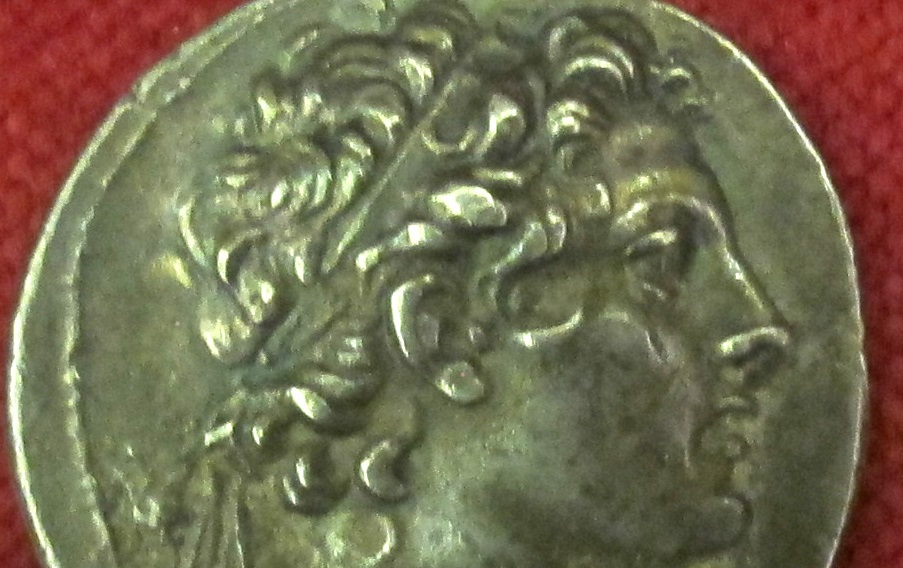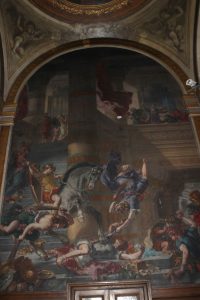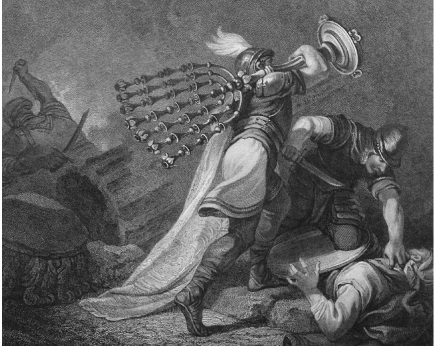
190 BC to 170 BC, Psalm 38: Antiochus Epiphanes.
This site was first built in French (see www.147thgeneration.net). The English translation was mainly done using « google translation ». We have tried to correct the result of this translation to avoid interpretation errors. However, it is likely that there are unsatisfactory translations, do not hesitate to communicate them to us for correction.
(for that click on this paragraph)
Summary
This generation is from the years 190 BC to 170 BC
According to our count, this generation is the 38th generation associated with Psalm 38. It is in this Psalm 38 that we therefore find an illustration of the facts of this generation.
Seleucus IV Philopator reigns over the Seleucid Empire. Under the weight of the debt imposed by the Romans, he is looking for money. The governor of Greater Syria sends Heliodorus, his prime minister, to Jerusalem to steal the riches of the Temple. Miraculous divine intervention thwarts Heliodorus’ plans. However the respite was short-lived because Seleucus was assassinated and his brother Antiochus IV Epiphanes was crowned king.
Jews try to assimilate to Greek culture.
The new king supports them and marks his hostility to Judaism. He enters the Temple without any respect, he loots and defiles it. It prohibits Jews from exercising their worship and obliges them to comply with pagan cults. Many Jews, all those who forsook the law of Moses, work with the king’s inspectors. They force the faithful Israelites to hide wherever they can take refuge.
Two years later, under the pretext of making peace, his soldiers sow death and desolation in Jerusalem. The city and the Temple are deserted.
Despite this, many Jews remain loyal to the alliance despite the heavy price to pay.
Talk
Heliodorus
The pressure of the wicked on Israel described in the previous psalm finds full illustration in the present generation. Indeed it is that of the reign of Seleucos IV Philopator and the beginning of reign of Antiochus IV Epiphanes.
The short reign of Seleucus IV Philopator (187 BC / 175 BC) already announces the reality of the Seleucid domination. This one under the weight of the debt imposed by the Romans to Antiochos III is in search of money.
It is in this context that the governor of Great Syria sends Heliodorus, his prime minister, to Jerusalem to monopolize the riches of the Temple:

- While[3] the holy city lived in perfect peace and the laws were strictly observed because of the piety of the high priest Onias and his hatred of evil,
- the kings themselves honored the place and glorified the temple with the most magnificent gifts.
- Thus Seleucus, king of Asia, defrayed from his own revenues all the expenses necessary for the liturgy of sacrifice.
- But a certain Simon, of the priestly clan of Bilgah, who had been appointed superintendent of the temple, had a quarrel with the high priest about the administration of the city market.
- Since he could not prevail against Onias, he went to Apollonius of Tarsus, who at that time was governor of Coelesyria and Phoenicia,
- and reported to him that the treasury in Jerusalem was full of such untold riches that the sum total of the assets was past counting and that since they did not belong to the account of the sacrifices, it would be possible for them to fall under the authority of the king.
- When Apollonius had an audience with the king, he informed him about the riches that had been reported to him. The king chose his chief minister Heliodorus and sent him with instructions to seize those riches.
- So Heliodorus immediately set out on his journey, ostensibly to visit the cities of Coelesyria and Phoenicia, but in reality to carry out the king’s purpose.
Antiochos IV Epiphanes
The rest of the story of II Maccabees tells how a miraculous divine intervention will cause the plans of Heliodorus to fail. However, the respite is short-lived because Seleucos is assassinated in 175 BC. His brother Antiochos IV Epiphanes took the opportunity to land in Asia Minor, seize Antioch and be crowned king.
With this new king, the misfortunes of Jews will reach their peak under Greek domination, illustrating, if necessary, the alarmist predictions of the previous psalm:
- There[4] sprang from these a sinful offshoot, Antiochus Epiphanes, son of King Antiochus, once a hostage at Rome. He became king in the one hundred and thirty-seventh year* of the kingdom of the Greeks.
- b In those days there appeared in Israel transgressors of the law who seduced many, saying: “Let us go and make a covenant with the Gentiles all around us; since we separated from them, many evils have come upon us.”
- The proposal was agreeable;
- some from among the people promptly went to the king, and he authorized them to introduce the ordinances of the Gentiles.
- Thereupon they built a gymnasium* in Jerusalem according to the Gentile custom.
- They disguised their circumcision and abandoned the holy covenant; they allied themselves with the Gentiles and sold themselves to wrongdoing.
The Greek temptation
Jews try to assimilate to Greek culture by denying their Jewish heritage, as described by Flavius Josephus:
- Onias [1], a high priest, being dead at the same time (- Hyrcanus, the last representative of the Tobiads, master of territories beyond the Jordan, family opposed to that of the Oniads who were responsible for worship in Jerusalem –), Antiochus ( Epiphanius), king of Syria, gave the great priesthood to Jesus, nicknamed Jason, brother of Onias, who had left only a young son, which we will talk about again. But Antiochus, having since been dissatisfied with Jason, deprived him of this dignity. He gave it to Onias, nicknamed Menelaus, his younger brother, who was one of the three sons that Simon had left and who were all successively high priests as we have said. Jason, not being able to suffer to be deprived of this charge, entered into a great dispute with Menelaus; and the children of Tobias declared for the latter. But most of the people favored Jason, and so they were forced to retreat alongside Antiochus. They told this prince that they were determined to renounce the customs of their country to embrace his religion and the way of life of the Greeks. They asked him to allow them to build a place of exercises in Jerusalem. He gave it to them; and then they covered the marks of circumcision so that they could not be distinguished from the Greeks even when, running and struggling, they would be naked, and thus abandoning all the laws of their fathers, they differed in no way from foreign nations.
It is this drift of the Jewish people that is evoked by the beginning of the psalm. In fact few Jews resisted the attraction of Greek culture with what it incorporates of pagan worship:

- A song of David, to make remembrance.
- O Lord, do not reprove me with Your anger, nor chastise me with Your wrath.
- For Your arrows have been shot into me, and Your hand has come down upon me.
- There is no soundness in my flesh because of Your fury; there is no peace in my bones because of my sin.
- For my iniquities passed over my head; as a heavy burden they are too heavy for me.
Greek hostility
To this drift of the Jews towards the Greek practices is added to the misfortune of the people of Israel the hostile attitude of Antiochus Epiphanes:
- In [2] the year 143 (169 BC), after the conquest of Egypt, Antiochus marched with a great army against the land of Israel and the city of Jerusalem.
- In his arrogance, he entered the Temple and took away the gold altar, the lampstand with all its equipment,
- the table for the bread offered to the Lord, the cups and bowls, the gold fire pans, the curtain, and the crowns. He also stripped all the gold from the front of the Temple
- and carried off the silver and gold and everything else of value, including all the treasures that he could find stored there.
- Then he took it all to his own country. He had also murdered many people and boasted arrogantly about it. 25 There was great mourning everywhere in the land of Israel.
- Rulers and leaders groaned in sorrow. Young men and young women grew weak.The beauty of our women faded.
- Every bridegroom sang a funeral song, and every bride sat mourning in her room.
- All our people were clothed with shame, and our land trembled for them.
The desperate situation of the Jews is well described in the rest of the psalm where the « light of my eyes » is likely to characterize the door lamp stolen:

- My boils are putrid; they fester because of my folly.
- I am very much stunned and bowed; all day I go around in gloom.
- For my loins are full of self-effacement; there is no soundness in my flesh.
- I passed out and was very crushed; I moaned from the turmoil in my heart.
- O Lord, all my desire is before You, and my sigh is not hidden from You.
- My heart is engulfed; my strength has left me, and the light of my eyes- they too are not with me.
However the attacks of Antiochus Epiphanes do not stop there. Two years later, under the pretext of making peace, his soldiers sow death and desolation in Jerusalem. The city and the Temple are deserted. But Antiochus also relies on part of the Jewish population to apply its rigorous policy to Jerusalem:
- Then[5] the king wrote to his whole kingdom that all should be one people,
- and abandon their particular customs. All the Gentiles conformed to the command of the king,
- and many Israelites delighted in his religion; they sacrificed to idols and profaned the sabbath.
- The king sent letters by messenger to Jerusalem and to the cities of Judah, ordering them to follow customs foreign to their land;
- to prohibit burnt offerings, sacrifices, and libations in the sanctuary, to profane the sabbaths and feast days,
- to desecrate the sanctuary and the sacred ministers,
- to build pagan altars and temples and shrines, to sacrifice swine and unclean animals,
- to leave their sons uncircumcised, and to defile themselves with every kind of impurity and abomination;
- so that they might forget the law and change all its ordinances.
- Whoever refused to act according to the command of the king was to be put to death.
- In words such as these he wrote to his whole kingdom. He appointed inspectors over all the people, and he ordered the cities of Judah to offer sacrifices, each city in turn.
- Many of the people, those who abandoned the law, joined them and committed evil in the land.
- They drove Israel into hiding, wherever places of refuge could be found.
The perilous situation of the Jews faithful to the divine covenant in the hands of the soldiers of King Antiochus Epiphanes and the Jews who preferred to abandon their faith is well summed up in the following verses of the psalm:

- And those who seek my life lay traps, and those who seek my harm speak treachery, and all day long they think of deceits.
- But I am as a deaf person, I do not hear, and like a mute, who does not open his mouth.
Loyalty in turmoil
Many Jews remain faithful to the alliance despite the heavy price to pay. Their resistance will lead to the beginning of the next generation of Seleucid exactions:
- On[6] the fifteenth day of the month Kislev, in the year one hundred and forty-five,* the king erected the desolating abomination upon the altar of burnt offerings, and in the surrounding cities of Judah they built pagan altars.
- They also burned incense at the doors of houses and in the streets.
- Any scrolls of the law* that they found they tore up and burned.
- Whoever was found with a scroll of the covenant, and whoever observed the law, was condemned to death by royal decree.
- So they used their power against Israel, against those who were caught, each month, in the cities.
- On the twenty-fifth day of each month they sacrificed on the pagan altar that was over the altar of burnt offerings.
- In keeping with the decree, they put to death women who had their children circumcised,
- and they hung their babies from their necks; their families also and those who had circumcised them were killed.
- But many in Israel were determined and resolved in their hearts not to eat anything unclean;
- they preferred to die rather than to be defiled with food or to profane the holy covenant; and they did die.
So some Jewish people, despite the attacks of Antiochus Epiphanes, do not deny the divine covenant They remain deaf to these strong injunctions of their faith in God, also aware of the mistakes that the people may have committed and who are in the process of to be atoned in this difficult time. This is illustrated by the end of the psalm which reiterates the Jewish people’s absolute trust in God and his confidence in God’s ultimate support for his salvation. Confidence implemented from this generation, and which will turn into revolt to the next generation:

- But I am as a deaf person, I do not hear, and like a mute, who does not open his mouth.
- And I was as a man who does not understand and in whose mouth are no arguments.
- Because I hoped for You, O Lord; You shall answer, O Lord, my God.
- For I said, « Lest they rejoice over me; when my foot faltered, they magnified themselves over me. »
- For I am ready for disaster, and my pain is always before me.
- For I relate my iniquity; I worry about my sin.
- But my enemies are in the vigor of life, and those who hate me for false reasons have become great.
- And they repay evil for good; they hate me for my pursuit of goodness.
- Do not forsake me, O Lord, my God; do not distance Yourself from me.
- Hasten to my aid, O Lord, my salvation.

[1] Flavius Josephus / Jewish Antiquities / Twelfth Book / Chapter 6. (French: Flavius Josèphe/Antiquités Juives/Livre douzième/chapitre 6).
[2] 1 Maccabees, Chapter 1, verses 20 to 28 (« Antiochus Persecutes the Jews« ).
(Following the translation of https://www.biblegateway.com/passage/?search=1%20Maccabees+1&version=GNT )
[3] 2 Maccabees, Chapter 3, verses 1 to 8
[4] 1 Maccabees, Chapter 1, verses 10 to 15
[5] 1 Maccabees, Chapter 1, verses 41 to 53
[6] 1 Maccabees, Chapter 1, verses 54 to 64

